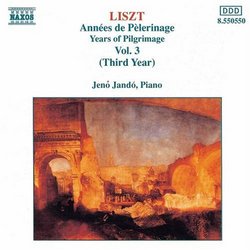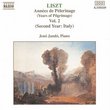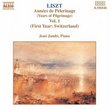| All Artists: Franz Liszt, Jenö Jandó Title: Liszt: Années de Pèlerinage, Vol. 3 (Third Year) Members Wishing: 1 Total Copies: 0 Label: Naxos Original Release Date: 1/1/1992 Re-Release Date: 2/15/1994 Genre: Classical Styles: Forms & Genres, Suites Number of Discs: 1 SwapaCD Credits: 1 UPC: 730099555029 |
Search - Franz Liszt, Jenö Jandó :: Liszt: Années de Pèlerinage, Vol. 3 (Third Year)
 | Franz Liszt, Jenö Jandó Liszt: Années de Pèlerinage, Vol. 3 (Third Year) Genre: Classical
|
Larger Image |
CD DetailsSimilar CDs |
CD ReviewsProsaic John Landkamer | Bothell, WA USA | 06/10/2000 (2 out of 5 stars) "I was dismayed from the first moments of this CD. Jando plays the opening bars of "Angelus" as though he's watching a ball game out of the corner of his eye. No focus, no intensity, no atmosphere and above all no poetry. Liszt himself would have hurled this aside in disgust. That said, my recommendation is to buy both this (it's cheap) and the version by Lazar Berman (inexpensive, and a remarkable value). As an exercise in discernment, listen to the second Cypress Threnody (track 3) played by the two pianists one after the other. In the "wind moaning in the trees" passages (where the accompaniment moves chromatically in sixths) Berman evokes a gloomy world of shifting shadows cast by moonlight. In Jando's hands, the same passage sounds like a finger exercise.Addendum (11/08/01) - Because it pains me to be in disagreement with leading critics, I decided to listen to this disk again just to be sure. Unfortunately, the playing was no better than I remembered. I'll focus on "Jeux d'eau." Jando's first two pages don't really have a tempo: he speeds up where it's easy and slows down where it's hard (e.g. at the pp leggierissimo non legato). Contrast this with Berman's introduction, which has a clear basic pulse and where the rubato is the result of musical logic rather than technical constraints. Jando's playing of the second part of the main theme (at "un poco espressivo") is rhythmically square with inelegant accents on many of the beats. Berman is better here, too, although he does agogically distort the triplet figure. One could go on and on, but in general Berman shows sensitivity and musicality in so many details, and Jando just doesn't. Again, those who are interested are encouraged to listen to both of these (and other versions) and decide for themselves.Addendum (12/13/02) - I know now that practically everyone plays "Angelus" like Jando. Perfunctory. No one should feel they know this piece until they've heard Lazar Berman. That moment when I put on Disc 3 of his set, expecting nothing, and heard those first few notes...like a wind chime in a desolate, post-nuclear world...was one of the great moments of my life." And I quote: drdolores | 10/25/2001 (5 out of 5 stars) ""The opening 'Angelus' shows Jando at his most imaginatively expansive and commanding, while 'Les jeux d'eaux a la Villa d'Este' sparkles and glitters: this is playing of great appeal. The dark power of 'Sunt lacrymae rerum' and the 'Marche funebre' bring resounding sonority from the piano's lower octaves, and then Jando provides more expansive rhetoric for the composer's flamboyant and not entirely convincing spritual apotheosis, 'Sursum corda'. A splendid and satisfying culmination to a set of performances that can be compared with the finest from the past. The secret of Jando's playing is that he is deeply involved in every note of Liszt's music."
(The Penguin Guide to Compact Discs and Cassettes, 1996)It's your call." |

 Track Listings (7) - Disc #1
Track Listings (7) - Disc #1
![Liszt: Piano Works [Box Set]](https://nationalbookswap.com/cd//m/18/4318/6094318.jpg)


